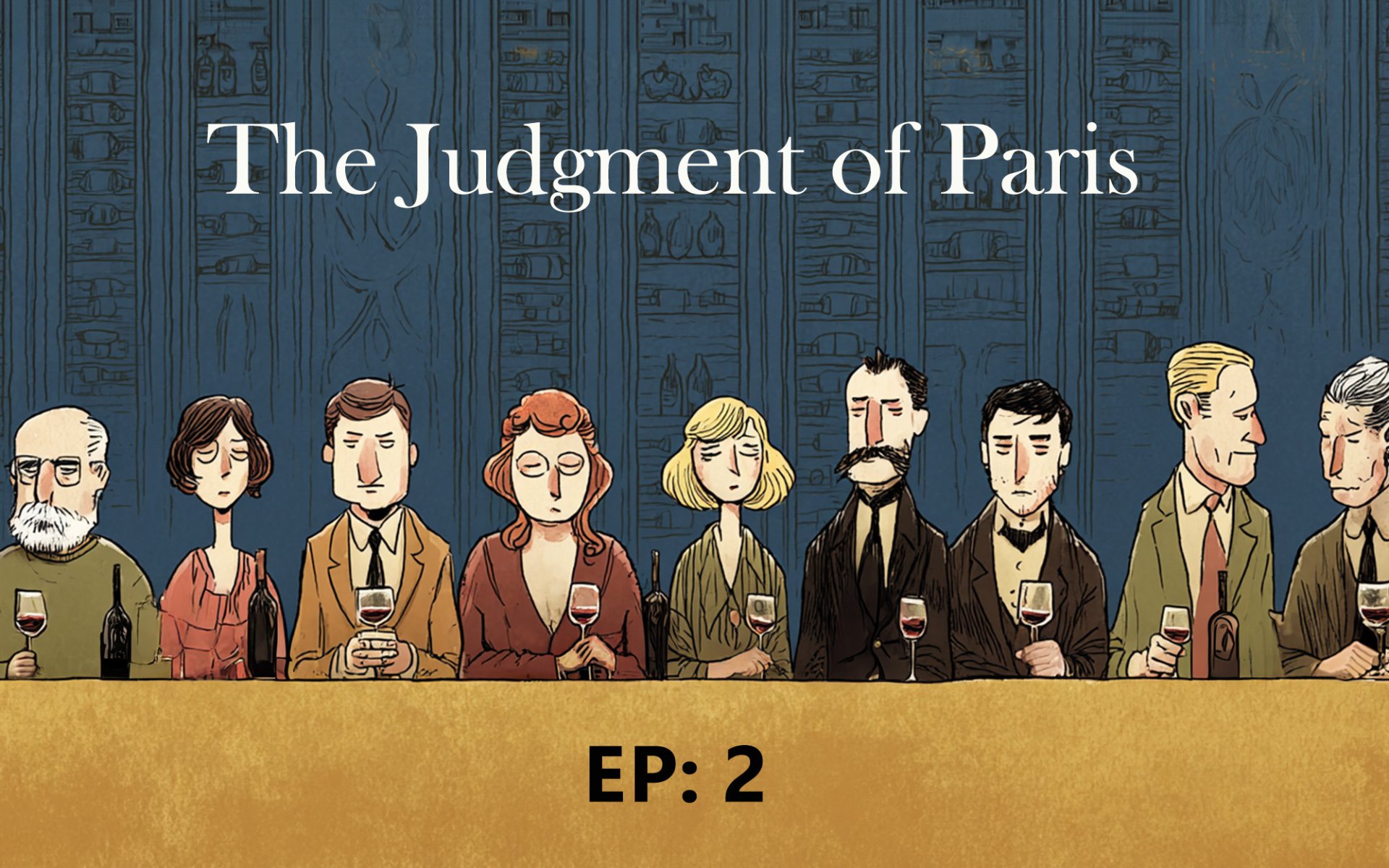The Judgment of Paris EP : 2

Steven Spurrier, the man behind the event, had meticulously prepared 20 bottles of wine for the blind tasting, divided into two categories:
White Wines (10 bottles): Six from Californias Chardonnay and four from Burgundy, France
Red Wines (10 bottles): Six from Californias Cabernet Sauvignon and four from Bordeaux, France
Each bottle was wrapped in a plain brown paper bag to conceal its label and origin. The judges all prominent French experts would evaluate solely based on aroma, flavor, balance, and impression, following the traditional 20-point French scoring system.
The Tasting Begins
The first round began with the white wines. Silence swept the room as judges swirled, sniffed, and sipped. Several nodded approvingly, exchanging confident remarks:This must be a superb Burgundy such finesse, such elegance!
Laughter and admiration echoed softly across the table. None of them imagined that the wine they were praising so highly was not French at all but a California Chardonnay.
Next came the reds. The judges tasted with serious focus, making their notes in silence. No one could anticipate what was about to unfold.
When the final scores were tallied, the atmosphere shifted. A whisper spread across the room
Best White Wine: Chateau Montelena Chardonnay 1973 from California.
Best Red Wine: Stags Leap Wine Cellars Cabernet Sauvignon 1973 from Napa Valley.
For a brief moment, the room went completely still.
Some judges stared at their papers in disbelief. Others refused to accept the results. Odette Kahn, editor of La Revue du Vin de France, reportedly asked for her score sheet back, insisting,
There must be some mistake may I change my score?
But Steven Spurrier stood firm. The results were final.
A Shock Heard Around the World
Pierre Bréjoux, head of the French National Wine Office, admitted,I was shocked but its true these wines are excellent.
The story might have faded quietly into obscurity, had it not been for one journalist who dared to report it: George M. Taber from Time Magazine.
In June 1976, his article titled The Judgment of Paris began with a sentence that stunned readers worldwide:
The unthinkable happened: California defeated France in a blind wine tasting in Paris.
That single line forever changed the course of wine history.
The Aftermath
Overnight, Chateau Montelena and Stags Leap Wine Cellars became legends.
Mike Grgich, winemaker at Chateau Montelena, later said,
That day was the moment we proved we belonged on the world stage. We were not lesser than France.
Warren Winiarski, founder of Stags Leap Wine Cellars, reflected,
I didnt set out to challenge France. I simply wanted to make the best wine I could.
But that event proved that here, in Napa Valley, we have the soil, the climate, and the passion to make truly great wine.
In France, the reaction was intense. Some refused to report the story, others dismissed it as coincidence. Yet in the United States, it became a symbol of national pride a moment that sparked rapid growth in Californias wine industry.
Steven Spurrier himself faced harsh criticism from the French community, accused of betraying their wine heritage. He calmly responded,
I never set out to undermine French wine. I only wanted to show that the world is larger than we think and that great wines can come from anywhere.
A New Era for the World of Wine
Subsequent rematches in the years following 1976 consistently confirmed the same result: California wines aged beautifully and continued to outscore their French counterparts. The myth had been shattered New World Wines were here to stay.Countries like Australia, New Zealand, Chile, Argentina, and South Africa soon followed, proudly stepping onto the world stage. The Judgment of Paris had opened the door for a global wine renaissance.
The event proved one timeless truth:
A great wine is not defined by tradition or reputation but by its quality.For wine lovers everywhere, it changed perceptions forever. Blind tasting became a standard of fairness, reminding the world that price and prestige dont always equal excellence.
Warren Winiarski summed it up best:
The Judgment of Paris didnt prove that American wines were better than French wines.It proved that great wines can come from anywhere as long as there is passion, dedication, and respect for the land.
Legacy of a Revolution
In the years that followed, Steven Spurrier received numerous honors, including appointment to the Order of the British Empire (OBE) and several Lifetime Achievement Awards, recognizing his contribution to reshaping global wine culture.Before his passing in 2021, he humbly reflected,
Im proud to have been part of something that changed the world of wine even though I never meant for it to happen.
Those simple yet powerful words capture the essence of a true wine lover one who believes that beauty in wine lies not in fame or luxury, but in openness, curiosity, and the courage to embrace the new.
Nearly five decades later, The Judgment of Paris remains a story retold in every wine school not just as history, but as inspiration.
It reminds us that reputation does not define worth, and that excellence can come from anywhere, as long as there is belief, dedication, and heart.
The End.


